Features
One trial. Over 47,000 participants. Nearly 200 hospital sites, across six countries. Ten results. Four effective COVID-19 treatments. And behind them all, an army of countless researchers, doctors, nurses, statisticians and supporting staff.
On the second anniversary of its official launch, the Randomised Evaluation of COVID-19 Therapy (RECOVERY) remains an exceptional study that is leading the global fight against COVID-19. The study is continuing to adapt to the changing dynamics of the pandemic, adding new promising candidate treatments, and launching in new countries with different population and healthcare systems.
It is likely that the true impact of RECOVERY can never be fully measured. But through discovering four treatments that effectively reduce deaths from COVID-19, it is certain that the study has saved thousands – if not millions – of lives worldwide. Crucially, low- and middle-income countries have shared these benefits, particularly since dexamethasone (the first treatment to be discovered) is inexpensive, easily administered and readily available in most hospitals.
The numbers are impressive, but each RECOVERY Trial participant has their own unique story, with many showing immense courage and altruism during one of the most difficult and frightening times of their life. As RECOVERY Trial participant John Hanna, who was put in an induced coma due to severe COVID-19, said: ‘Without the RECOVERY Trial, I don’t think I’d be here today, so I’m very grateful for all the work the team has done since the pandemic struck. I had minimum knowledge of clinical trials before COVID-19, but now I understand the important role these play, and that future studies will be needed to prepare the world for the next pandemic. Since taking part in the trial, I have become a member of the RECOVERY Trial’s Public Advisory Panel, and this gives me a feeling of involvement, belonging and pride to be contributing to something that has been so successful and continues to be.’
But the RECOVERY Trial’s impacts go far beyond saving lives and improving treatment of COVID-19 patients. Through pioneering a simplified, streamlined approach to running clinical trials, RECOVERY has redefined the speed at which life-saving results can be delivered. As Sir Martin Landray, Professor of Medicine and Epidemiology at Oxford Population Health, and Joint Chief Investigator for RECOVERY, said: ‘In 2019, I had no idea that I would be setting up a trial of treatments for an infectious disease, let alone a pandemic virus. I certainly would not have thought it possible to go from a blank piece of paper to enrolling the first patient in nine days, to finding the first life-saving treatment within ten weeks, and for it to be made standard NHS policy within three hours.’
Through integrating into routine care within NHS hospitals, RECOVERY has also shown the power of engaging front-line clinicians in research. Sir Martin Landray added: ‘For many doctors and nurses, their involvement with RECOVERY was their first experience of clinical research, and many have expressed an enthusiasm to continue. This experience could herald a new age for research, not just for this pandemic and the next but for other common infections such as influenza and chronic diseases.’
Timeline showing the development of the RECOVERY trial, from March 2020 to March 2022, including key drug discoveries
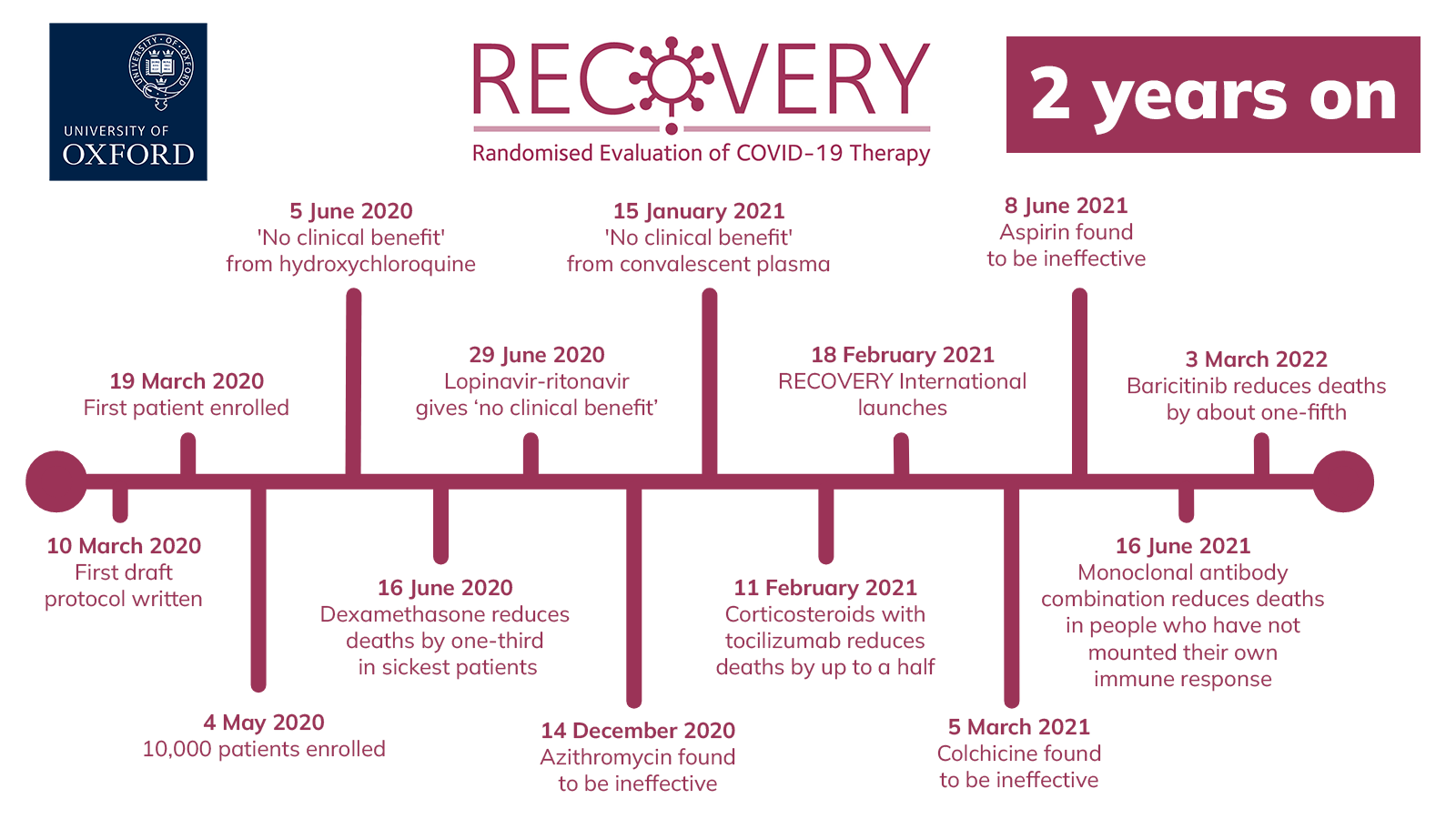
Dr Marion Mafham, Data Linkage Team Lead for RECOVERY, said: ‘RECOVERY brought clinical trials into everyday healthcare delivery, with frontline doctors and nurses consenting and enrolling participants directly at 177 hospitals across the UK. By integrating data from multiple sources, RECOVERY has produced rapid, reliable results improving outcomes in patients admitted to hospital with COVID-19. This required our team to use innovation and effective collaboration, identifying the right datasets, linking them to the trial participants and processing the data, while ensuring data security and quality - all whilst working remotely.’
Health and Social Care Secretary Sajid Javid said: 'Throughout the pandemic, the government has supported the UK’s world-leading research sector, with millions of pounds of funding for clinical trials into the most promising and innovative medicines. This includes around £2.1 million for the RECOVERY trial which has saved countless lives across the world.
'I am extremely grateful to the team at the University of Oxford – the brilliant work on RECOVERY has cemented the UK’s position as a global leader in identifying safe and effective treatments for Covid, helping the UK to live with this virus.
'I look forward to continuing to collaborate to identify more lifesaving treatments.'
For the wider public, the extensive media coverage of the study’s impacts has helped to increase awareness of the importance of clinical trial research, and the need for volunteers to take part in these. Meanwhile, beyond the UK it is hoped that the hospital sites participating in RECOVERY International will benefit from a long-term increased capacity for leading randomised controlled studies.
The RECOVERY Trial team extend their thanks to the many clinical staff who have made this trial possible, the thousands of patients who have taken part, and the funders for the study, particularly the National Institute for Health Research (NIHR), Wellcome, and UK Research and Innovation (UKRI).
By Professor Robert Hope, professor of water policy, director of the REACH programme.
Water is vital – not just for drinking and health, but for life chances and education. Without water, how can you learn? And yet more than half a billion children around the world do not have access to basic water supplies in schools.
Today, on World Water Day, the REACH programme to improve water security for 10 million poor people in Africa and Asia is releasing an animated film to highlight the critical importance of water, climate and education in Kenya.
We all recognise the need for water for handwashing as well as for drinking, sanitation, food preparation and cleaning facilities. But water matters to educational outcomes. In many countries, providing reliable and safe water to schools is a challenge. Globally, an estimated 584 million children lack basic water in schools. In Africa, four in ten rural schools do not have access to basic water supplies.
We all recognise the need for water for handwashing as well as for drinking, sanitation, food preparation and cleaning facilities. But water matters to educational outcomes
Girls are particularly affected by insufficient water, especially if there are no facilities and water for menstrual hygiene.
Global evidence shows girls who complete secondary education are more likely to get better paid jobs, shape their family choices, and pass on these opportunities to their children compared to girls who drop out of school early. In Kenya, investments are being made to ensure water is available in rural schools by providing tanks for rainwater harvesting. This is a good option in areas where rainfall is reliable throughout the year.
 Rainwater harvesting tank. Photo by Rob Hope.
Rainwater harvesting tank. Photo by Rob Hope.But, in Kenya, rainfall patterns are increasingly unpredictable with many dry months. Rainwater tanks often do not last through dry periods, leaving schools with limited alternatives. Schools then face difficult choices depending on access to other water sources.
Oxford University researchers have supported the work of a local professional service provider, FundiFix Ltd, to guarantee repairs in water supplies in schools, clinics and communities water are fixed fast. Some 80,000 people benefit today from FundiFix’s work with future initiatives working to scale and sustain the benefits for millions more.
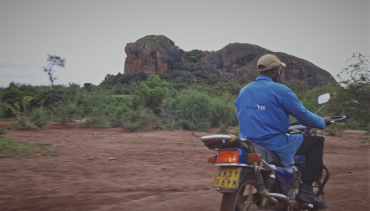 FundiFix bike. Photo by Jeff Waweru
FundiFix bike. Photo by Jeff WaweruVladimir Putin has long insisted Ukraine is part of the country he rules. This was painted more starkly than ever as he announced that Russian troops were undertaking a “special military operation” in its western neighbour. But to the rest of the world, what Russia is undertaking is simply an invasion.
Putin has been softening up the world for its latest foreign policy adventure for some years now.
'Kiev is the mother of Russian cities,' he wrote in March 2014. 'Ancient Rus is our common source and we cannot live without each other.'
A few days later, Russia completed the annexation of Crimea. Eight years later, during which time more than 14,000 people have died in a Russian-instigated war of insurgency in the Donbas region of eastern Ukraine, he has returned to this theme – backed by the might of Russia’s armed forces.
The Russian president made this intention crystal clear in an hour-long and fairly wide-ranging speech on February 21.
'Ukraine is not just a neighbouring country for us,' he told the Russian people in a national broadcast. 'It is an inalienable part of our own history, culture and spiritual space.'
He [Putin] repeatedly denied Ukraine’s right to independent existence – and, at times, that the country exists at all as an independent entity. Instead he appeared to accept the unity of the two countries as historical fact
He repeatedly denied Ukraine’s right to independent existence – and, at times, that the country exists at all as an independent entity. Instead he appeared to accept the unity of the two countries as historical fact. In doing so, he revealed the structures of an imperial ideology with a chronology and ambition that goes far beyond post-Soviet nostalgia to the mediaeval era. But to what extent is that ideology shared by Russians?
One of the striking elements of Putin’s latest speech about Ukraine, which accompanied the recognition of Donetsk and Luhansk as independent states, was his insistence that Ukraine exists as a by-product of Russian history, 'Since time immemorial, the people living in the south-west of what has historically been Russian land have called themselves Russians and Orthodox Christians.'
One of the striking elements of Putin’s latest speech about Ukraine...was his insistence that Ukraine exists as a by-product of Russian history...But he later undercut his insistence...stating, 'Modern Ukraine was entirely created by ...Bolshevik, Communist Russia
But he later undercut his insistence of these shared origins, stating, 'Modern Ukraine was entirely created by Russia or, to be more precise, by Bolshevik, Communist Russia.'
To him, the making of modern Ukraine only started 'after the 1917 revolution', and Ukrainians have 'Lenin and his associates' to thank for their state. This was a reference to Lenin’s creation of a federation of Soviet states, the USSR, out of the ethnic diversity of the former Russian empire.
In reality, Ukrainian aspirations for statehood predated revolution by at least two centuries. From the Ukrainian Hetmanate’s 1710 Bendery Constitution to the 1917 establishment of the West and Ukrainian People’s Republics and appeals at the Paris Peace Conference for status, Ukrainians have continuously asserted themselves as a distinct people.
The formation of the USSR was, in part, conditioned by the previous creation of these two independent Ukrainian Republics in the aftermath of the revolution and the disintegration of the Austro-Hungarian Empire. These republics stemmed directly from the 19th century Ukrainian romantic national movement that reassessed the impact of the Cossack past, fuelling the development of an identity centring on a distinct language, culture, and history.
In reality, Ukrainian aspirations for statehood predated [the Russian] revolution by at least two centuries
When the Bolsheviks, Lenin at their head, took control over the Ukrainian territories, the idea of Ukraine as an independent nation could not be ignored, and led to the independent status – on paper – of the Ukrainian Soviet Republic in 1922.
What Putin’s address reveals is the desire to plot Russian and Ukrainian history through the lens of imperialism
What Putin’s address reveals is the desire to plot Russian and Ukrainian history through the lens of imperialism. He is attempting to establish a direct line from shared ancient origins to a first and second Russian empire: one under the Romanov Tsars (1721-1917) and the second as part of the USSR.
Across those two imperial epochs, Ukraine is reduced to a tributary state and mentions of national aspirations are smothered. This is precisely the message that the Kremlin continues to disseminate in the 21st century.
A lack of popular appetite
But what does the Russian public believe? Three decades ago, when the USSR collapsed, only rare and often ultra-nationalist politicians resorted to imperial history in imagining Russia’s post-soviet future. As early as the 1990s, ultra-nationalist politician Vladimir Zhirinovsky advocated ceasing coal supplies to Ukraine as a tactic to bring back Russia’s lost territories, but he remained a fringe figure in Russian politics.
Still, in 2011 and 2012 Global Attitudes surveys conducted by Pew Research Centre, support for imperial ideology was not insignificant. When asked whether 'it’s natural for Russia to have an empire', only 31% of Russian respondents disagreed. Whether nostalgia for empire translates to appetite for war to 'regain territory' remains unclear.
It is impossible to paint all Russian perceptions of Ukrainians with the same brush. Russian feelings toward their neighbour have historically ranged from genuine feelings of brotherhood and warmth to virulent expressions of xenophobia manifesting in episodes of ethnic cleansing, such as the 1932 orchestrated famine known as the Holodomor.
Only 26% of Russians wanted the Donbas to become part of Russia, while 54% are in favour of varying forms of independence...War remains an unpopular choice, with only 18% of Russians unreservedly supporting armed conflict
But when it comes to the question of how Russia should position itself with regards to claiming eastern Ukrainian provinces as long-lost parts of the 'Russian empire', opinion is more clearly divided. Only 26% of Russians wanted the Donbas to become part of Russia, while 54% are in favour of varying forms of independence (within Ukraine or separate). War remains an unpopular choice, with only 18% of Russians unreservedly supporting armed conflict in defence of the two breakaway republics in a poll from April 2021.
Post-Soviet neo-imperialism
The rhetorical and physical erasure of Ukrainian history and identity makes it much easier to assert claims of shared Russian heritage
Ultimately, the use of 'empire' as an ideology reveals Russia’s yearning for – or sense of entitlement to – a third imperial regime. The rhetorical and physical erasure of Ukrainian history and identity makes it much easier to assert claims of shared Russian heritage. This will be important to bear in mind as we watch the development of this renewed conflict over Ukraine.
Parallels with other formerly colonised peoples abound. But, as Kenya’s envoy to the UN put it, no matter what conditions presided over the drawing of modern borders, 'we must complete our recovery from the embers of dead empires in a way that does not plunge us back into new forms of domination and oppression'.![]()
Olivia Durand is a Postdoctoral associate in history, University of Oxford
This article is republished from The Conversation under a Creative Commons license. Read the original article.
Augustine, Aquinas, Newman, Bonhoeffer and…James Cone. Next year, the renowned ‘father’ of Black Liberation Theology joins the ranks of ‘Special Theologians’, who can be studied in-depth by senior Oxford Theology students.
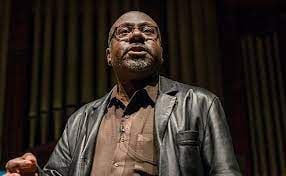 Professor Anthony Reddie
Professor Anthony Reddie During lockdown, the Research fellow of Regent’s Park College was looking through the list of ‘Special Theologians’, studied by third year Theology students. And, says Professor Reddie, he realised, ‘They are all great people, but no one was modern and no one was writing out of a contextual experience.’
Professor Reddie continues, ‘I was aghast that we are not studying James Cone when he left such a huge and important body of work [Cone died in 2018].’
He put the suggestion to a senior member of the faculty and Professor Reddie says, ‘I was pushing at an open door as it turned out.’
His idea was approved – and the process for creating the course began. And, from the next academic year, third year students will be able to opt to study James Cone with Professor Reddie.
In the US at the time, Sunday mornings were the most segregated time of the week, with people dividing on racial lines to go to church...Cone thought it was terrible that the white churches colluded with segregation
Professor Anthony Reddie
Although comparatively little known in the UK, Cone has been a major figure in US theology for decades. Professor Reddie says, ‘Cone called out racism in the existing Christian tradition. In the US at the time, Sunday mornings were the most segregated time of the week, with people dividing on racial lines to go to church.’
He adds, ‘Cone thought it was terrible that the white churches colluded with segregation.’
According to Professor Reddie, Cone’s academic career started around the time of the rise of the Black Power movement in the late 1960s and began with a 1969 work, Black Theology and Black Power.
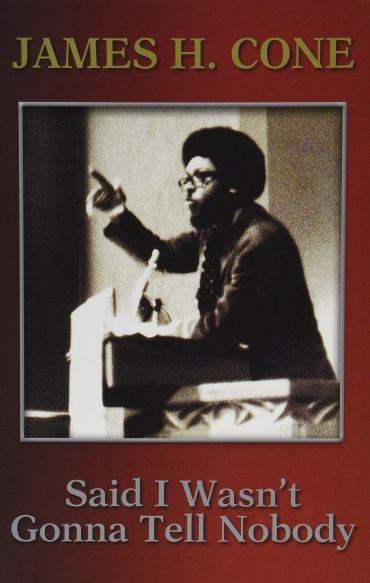 Autobiographical reflections, published by Orbis
Autobiographical reflections, published by OrbisProfessor Reddie maintains, Black Liberation Theology has similar foundations to Liberation Theology. He says, ‘Liberation Theology says God has a special relationship with the poor and marginalised. In the same way, Black Liberation Theology maintains God has a special relationship with the people of African descent.’
Professor Reddie maintains, Black Liberation Theology has similar foundations to Liberation Theology
He adds, ‘Black Liberation Theology looks at how Christianity became part of the colonial project and was tied into slavery…There were individuals of course, such as Wilberforce, who were Christian opponents of slavery. But the Church of England was tied into the establishment…and Christianity was used in order to make people better slaves.’
Cone, says Professor Reddie, sets down the architecture for a systematic Black Liberation Theology.
‘He was radical in terms of challenging the silence of church leaders in the face of white supremacy,’ says Professor Reddie.
Cone’s ideas were based on US specific circumstances. Many African Americans had lived in the country for centuries longer than white immigrants and would never consider themselves anything other than Americans, according to Professor Reddie. In the UK, however, he says, the colonial backgrounds of many diverse communities present different challenges.
‘There is a sense of not belonging anywhere, although that is not shared by younger people, whose parents were born in the UK,’ he says.
It is not about having “a person of colour” for the sake of it. Cone is on the syllabus because he is brilliant...Now I just have to wait to see if anyone wants to do the course
Professor Reddie
But Professor Reddie feels very much at home in Oxford. He laughs, ‘I don’t have imposter syndrome…but that’s because I came at the right time – when I was old enough not to feel intimidated. I don’t know if I would have survived at 18…but I enjoy it now.’
‘There is intellectual openness, but James Cone ticked every box,’ he says.
Having said that, though, Professor Reddie concludes, ‘It is not about having “a person of colour” for the sake of it. Cone is on the syllabus because he is brilliant.’
‘Now I just have to wait to see if anyone wants to do the course,’ he laughs.
Read more about Professor Reddie here.
Right now, there is arguably no greater technical challenge for the UK, and the rest of the world, than the energy systems transition. Radical challenges require radical solutions.
The way we source energy, the way we use it domestically, at work, the way transport is powered...and how this is all financed and implemented – are all pieces of an extremely complex puzzle
The way we source energy, the way we use it domestically, at work, the way transport is powered and how this is all financed and implemented – are all pieces of an extremely complex puzzle.
Recent international diplomatic crises, surges in UK energy prices and political lobbying have starkly highlighted this.
Each component of our energy system presents its own challenge, with its own stakeholders, and yet each needs to work seamlessly together in a unified system, if we are to meet our carbon reduction commitments.
Everyone needs to be able to adapt to the changes and they need to benefit those at all stages of life, financial situations and geographical locations.
Such complexity requires the minds of many, and for all considerations to be represented in the thinking. Technological innovation and changes in habit will only be embraced if they work on the ground and benefit lives already stretched with demands on time and money.
A new world-leading multi-disciplinary hub and co-working space in Oxford, Mini TESA - The Energy Systems Accelerator pilot - aims to...tackle the challenge. And this month, it opens its doors
A new world-leading multi-disciplinary hub and co-working space located in Oxford, Mini TESA - The Energy Systems Accelerator pilot – aims to bring such minds together to tackle the challenge. And this month, it opens its doors.
Located in a converted 1960s building on an industrial estate, that is home to an assorted mix of research labs, start-ups, social enterprises and wholesale food markets, a stone’s throw from the city’s rail station, the refitted interior is a vision for a new way of working and a catalyst for change.Inside this building three exciting things are happening simultaneously, which could just lead the way to creating a blueprint for the UK’s energy systems transition.
Firstly, in a unique working arrangement, scientists are sharing space with social enterprises, industrial and local government stakeholders. Concerns about intellectual property (IP) which have traditionally funnelled scientific groups into tightly protected groups, working in highly specialised siloes, have been re-thought so a shared mission enables collaborations previously thought impossible.
Secondly, scientists, researchers and university academics from a wide variety of disciplines are physically working together to pool expertise and think through problems from multiple perspectives – from the sharp end of technological challenges and the economics of how this works in financial systems, to the human behaviour considerations needed for adaptation.
Thirdly, teaching and research are flourishing side by side with the University of Oxford’s MSc in Energy Systems led by Professor Wallom, taught in open, adaptable learning spaces right across the hall from one of the country’s most prestigious energy research labs led by Malcolm McCulloch - Associate Professor in Engineering Science and head of the Energy and Power Group at the University of Oxford.
This is one of many innovative projects that aims to accelerate the UK’s economic revival while delivering sustainable growth across the country
Greg Hands MP, Minister for Energy, Clean Growth and Climate Change
Greg Hands MP, Minister for Energy, Clean Growth and Climate Change, said on its launch: ‘Today marks an exciting new chapter for Oxfordshire with this flagship project set to make waves across the UK energy sector and local economy.
‘As part of the Government’s ‘Getting Building Fund’, this is one of many innovative projects that aims to accelerate the UK’s economic revival while delivering sustainable growth across the country.’
Professor Chas Bountra, Pro-Vice Chancellor (Innovation) for the University of Oxford, said: ‘The University is proud to be leading this project, bringing together engineers, scientists and social scientists from within the University to work closely with businesses and civic stakeholders.
‘The Oxford innovation ecosystem is the perfect place for this collaboration to ensure we make the very best improvements to energy systems that will contribute to a zero-carbon future. Not only that, but TESA will support entrepreneurs building new businesses, create jobs, and encourage investment and economic growth in the local community and across the UK.’
The Oxford innovation ecosystem is the perfect place for this collaboration....Not only that, but TESA will support entrepreneurs building new businesses, create jobs, and encourage investment and economic growth
Professor Chas Bountra, Pro-Vice-Chancellor, Innovation
The radical approaches piloted here are part of a distinct and focused vision which has its sights on a new, permanent building, employing 800 people from a broad spectrum of professional backgrounds to make the energy systems transition happen in the most efficient, sustainable and equitable way possible.
Mini TESA has four years to prove its approach will lead to the outcomes the country and our planet need to safeguard the future. And while ‘serendipitous innovation’ is a watchword of what is hoped will happen within these walls, there is nothing accidental about its development.
With Oxford spearheading two of the country’s major demonstrator clean growth projects funded through Innovate UK’s Industrial Strategy Challenge Fund – Project Local Energy Oxfordshire (LEO) and Energy Superhub Oxford, the city is fast becoming a sustainable energy pioneer by making itself both the subject and instrument of research and planning. The aim is that by fusing the vision, the precision and the pragmatism, its solutions will be ready to scale up with speed when the policy lights turn green.
- ‹ previous
- 11 of 248
- next ›
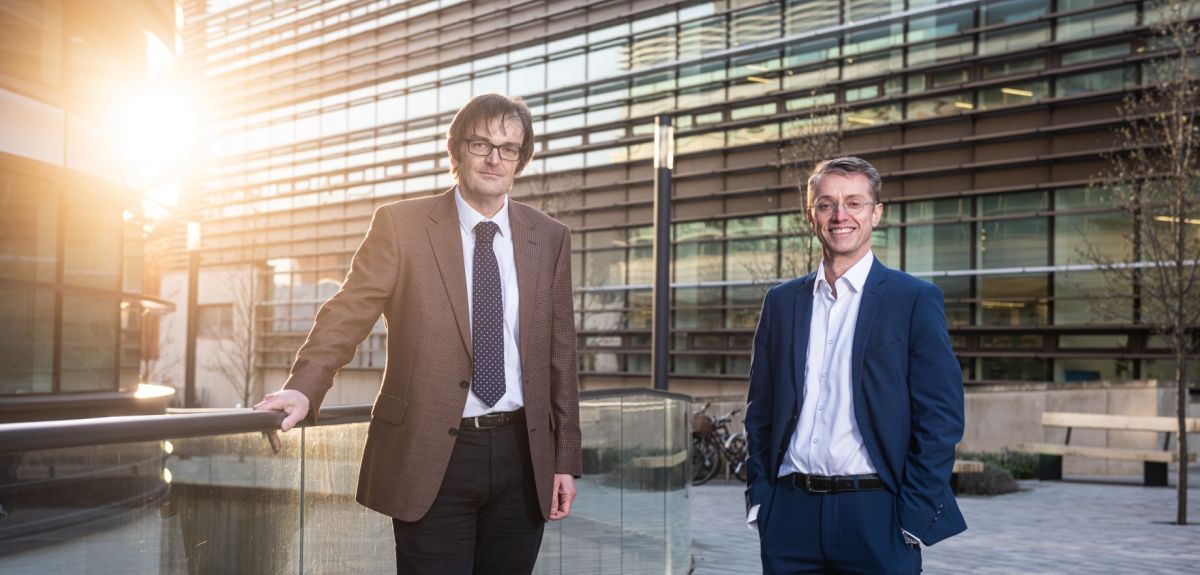
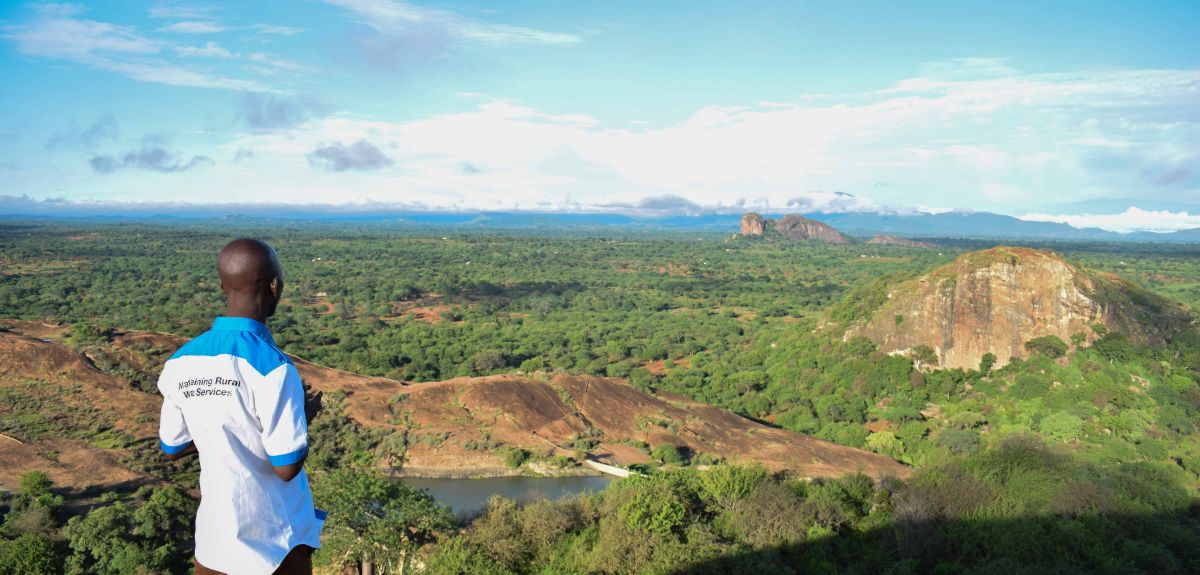
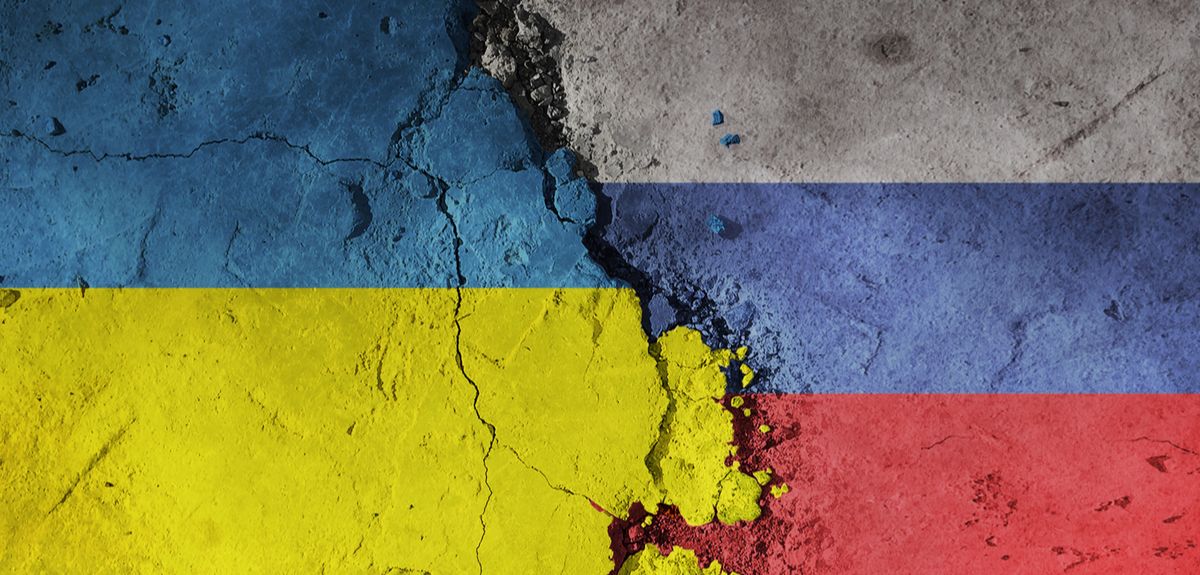

 Teaching the World’s Future Leaders
Teaching the World’s Future Leaders  A blueprint for sustainability: Building new circular battery economies to power the future
A blueprint for sustainability: Building new circular battery economies to power the future Oxford citizen science project helps improve detection of antibiotic resistance
Oxford citizen science project helps improve detection of antibiotic resistance The Oxford students at the forefront of the fight against microbial resistance
The Oxford students at the forefront of the fight against microbial resistance  The hidden cost of AI: In conversation with Professor Mark Graham
The hidden cost of AI: In conversation with Professor Mark Graham  Astrophoria Foundation Year: Dr Jo Begbie reflects on the programme’s first year
Astrophoria Foundation Year: Dr Jo Begbie reflects on the programme’s first year World Malaria Day 2024: an interview with Professor Philippe Guerin
World Malaria Day 2024: an interview with Professor Philippe Guerin From health policies to clinical practice, research on mental and brain health influences many areas of public life
From health policies to clinical practice, research on mental and brain health influences many areas of public life From research to action: How the Young Lives project is helping to protect girls from child marriage
From research to action: How the Young Lives project is helping to protect girls from child marriage